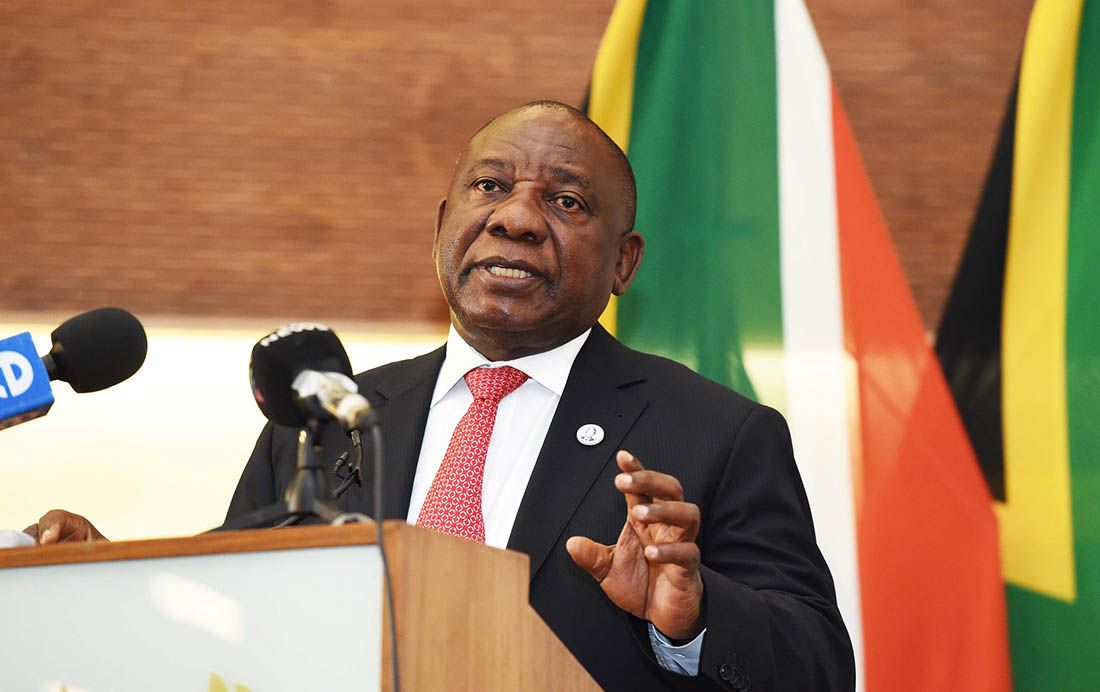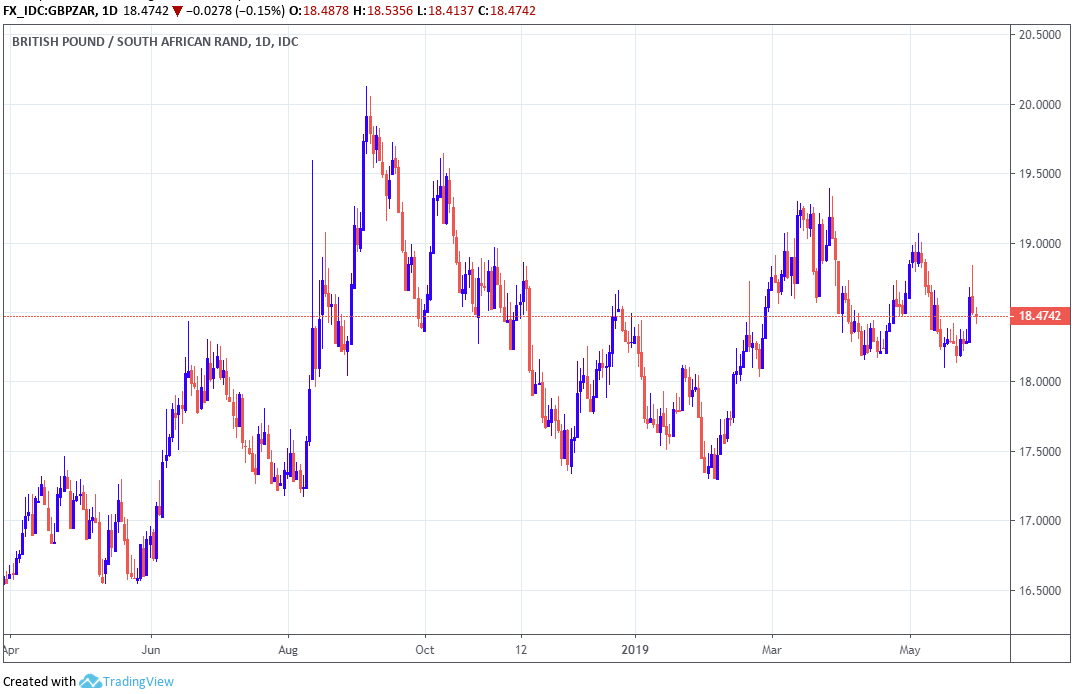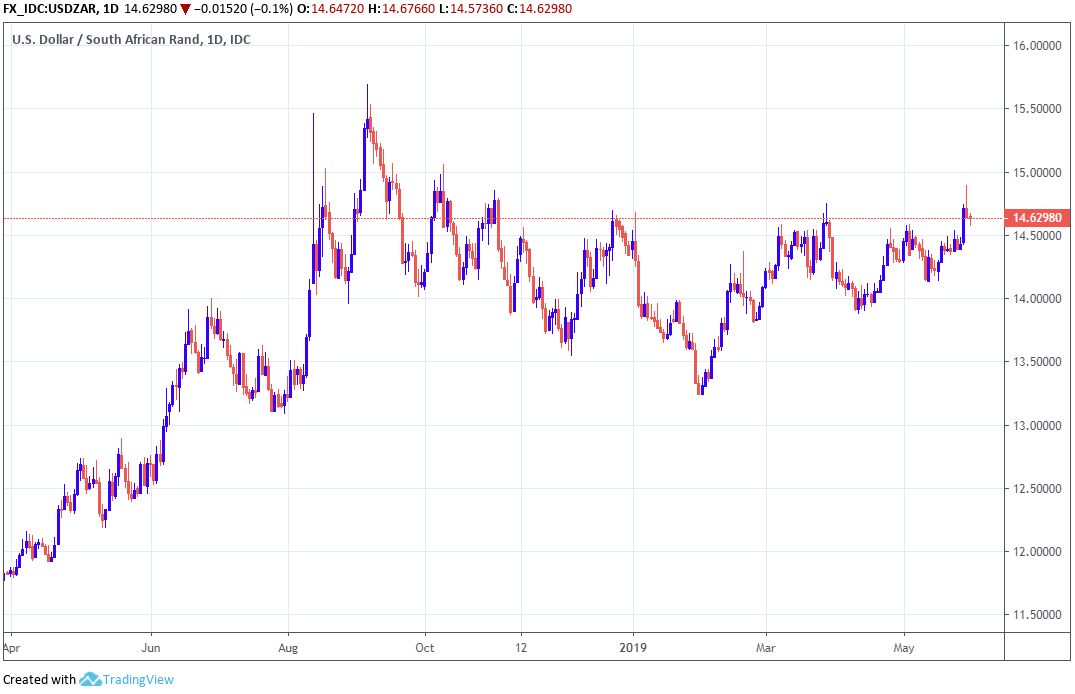The Rand Catches Bid as Market Cheers Cabinet Appointments but Further Gains Seen as Limited
- Written by: James Skinner

Image © Government of South Africa, reproduced under CC licensing
- ZAR recovers as Ramaphosa leaves key posts in reformist hands.
- Cabinet must pursue more than just low-hanging fruits on reforms.
- Eskom a landmark test of Ramaphosa's resolve on public finances.
- U.S.-China trade war to weigh on ZAR, emerging markets up ahead.
The Rand was resurgent Thursday, building on gains wracked up during the overnight session, after President Cyril Ramaphosa allayed market concerns over the composition his cabinet although analysts say that further gains for the South African currency will be limited.
President Cyril Ramaphosa reappointed Tito Mboweni and Pravin Gordhan to the key roles of finance minister and minister for state enterprises, which are the most significant positions in cabinet as far as the market is concerned.
However, David Mabuza was also reappointed as deputy president despite being dogged by links to a series of scandals while Premier of Mmpumalanga, and several other tainted ministers are also said to have been reappointed.
Nonetheless, the most important positions have been filled with candidates that are perceived by analysts as credicle and market-friendly. This is why the Rand rebounded from earlier losses overnight and into Thursday.
"The market seems to ignore that the ascent of Ramaphosa to ANC and national presidency is a function of David Mabuza's support in the Dec 2017 Elective Conference. Had Mabuza not supported Ramaphosa against opposing candidates sponsored by Zuma, Ramaphosa would not be president today. Therefore, the slow process of cleansing the ANC and the continued crackdown on corruption will have to pay the cost of having Mabuza sitting in the cabinet as Ramaphosa's deputy," says Cristian Maggio at TD Securities.
ANC WELCOMES AND CONGRATULATES NEW CABINET ANNOUNCED BY CDE CYRIL RAMAPHOSA #Cabinet2019 #CabinetAnnouncement pic.twitter.com/99URzD9tYc
— African National Congress (@MYANC) May 29, 2019
South African lawmakers face a steep uphill climb to right the nation's finances and restore market as well as public confidence in state institutions. Those are prerequisites for the country to retain its last remaining 'investment grade' credit rating, which is assigned by Moody's and up for review in November.
Losing the Moody's rating would mean many international investors, particular those that benchmark to the Citi World Government Bond index, are automatically forced into selling their South African government bonds.
This would force government funding costs higher by lifting bond yields and drive the Rand into the ground in the process as investors seek to swap capital back into their domestic currencies.
"The construct of the executive will ensure policy continuity in key portfolios such as Finance and Public Enterprises, to which experienced and well-regarded individuals have been assigned, undoubtedly shoring up market confidence," says Nema Ramkhelawan-Bhana at Rand Merchant Bank. "Cabinet will come under scrutiny given certain individuals who underperformed under previous administrations continue to hold ministerial posts. For investors though, the question shifts from the who to the how and the when?"

Above: Pound-to-Rand rate shown at daily intervals.
A key priority of Ramaphosa's when it comes to the public finances will be balancing the demands of rating agencies with addressing South Africa's weak economy, bloated government, troubled public sector and litany of social needs.
The bloated government has already faced the proverbial axe, with South Africa's reformist president reducing the number of government minister from 36 to 28. However, it could be argued that this is still too high a number for a country of 57 million people.
China, with its population of 1.3 bn has just 21 ministers and the U.S., with its population of 327 million, has just 15 ministers. Analysts and rating agencies will no doubt hope that Ramaphosa's other reforms will be more ambitious than his downsizing of government.
"The market took hope from the fact that Tito Mboweni will remain Finance Minister and that former Finance Minister Pravin Gordhan will become Minister for Public Enterprises. Both candidates had experienced resistance from Cosatu, the country’s largest labour group, but obviously Ramaphosa is able to push through his political agenda against such resistance," says Ulrich Leuchtmann, head of FX strategy at Commerzbank.

Above: USD/ZAR rate shown at daily intervals.
Eskom, the financial troubled utility provider that might struggle to repay ZAR 350 bn of government guaranteed debt, is an example of the institutional challenges that Ramaphosa and his new cabinet will need to fix if they are to save South Africa's credit rating.
The embattled firm, which saw its CEO resign last week, is a direct threat to the government's efforts at reducing spending and bringing down the national debt pile. Public spending this year is expected to produce a budget deficit of -4.5% of GDP, up from 4% last year and above the 4.3% projected back in October.
Eskom has received multiple cash injections in recent years and could yet require more assistance before the years is out. The implementation of an earlier plan to break up the utility into three more manageable divisions that could attract private capital will be a landmark test of Ramaphosa's resolve.
However, and given a testing international environment that is boosting demand for the U.S. Dollar, further meaningful gains for the South African Rand might be limited in the short-term no matter what President Ramaphosa and his new cabinet do next.
"For as long as high-frequency economic data continues to disappoint and US-Sino trade tensions escalate, markets will favour safe-haven assets, leaving emerging markets to consolidate gains where possible. That’s of little comfort to the rand market," RMB's Remkhelawan-Bhana writes, in a briefing to clients.
The U.S. and China have been engaged in a tariff fight for more than a year now, which began due to U.S. concerns about China's "unfair trading practices". But the 'trade war' could now be on the verge of morphing into an all-out economic conflict.
This is driving international capital flows away from emerging markets and toward the safe-haven and relatively high-yielding U.S. Dollar. It's also happening at a time when both global and South African economies are weakening, which will complicate Ramaphosa's task.
"We stick with the view that external developments are going to be more important than local developments for the rand over the next few weeks. Trading-wise, we are biased in favor of tactically fading extreme moves in USDZAR on both directions if they lead to substantial decoupling from the EM FX complex," says Nimrod Mevorach at Credit Suisse.
Time to move your money? Get 3-5% more currency than your bank would offer by using the services of foreign exchange specialists at RationalFX. A specialist broker can deliver you an exchange rate closer to the real market rate, thereby saving you substantial quantities of currency. Find out more here.
* Advertisement




